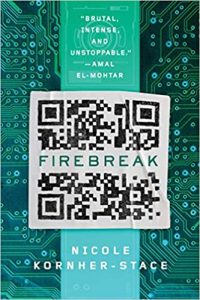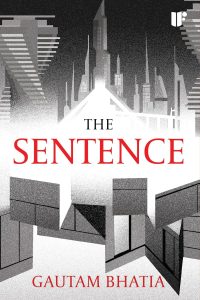Maya C. James Reviews Firebreak by Nicole Kornher-Stace
 Firebreak, Nicole Kornher-Stace (Saga 978-1-9821-4274-2, $26.99, 416pp, hc) May 2021.
Firebreak, Nicole Kornher-Stace (Saga 978-1-9821-4274-2, $26.99, 416pp, hc) May 2021.
Nicole Kornher-Stace’s Firebreak has the kind of dead-end future that hits a little too close to home – people working numerous part-time jobs to eke out a living, sharing an overpriced, shitty apartment with numerous roommates, and barely surviving under an evil megacorporation that gives out company credits instead of a living wage. The same company, by the way, facilitates war crimes, and monetizes their super soldiers via memorabilia and NPCs in their popular streaming game: SecOps.
In this near-future United States, each of the remaining 45 states have been auctioned off to separate corporations. As corporations tend to do – they merged until only two were left: Stellaxis Innovations, which owns the country’s water supplies, and Greenleaf, which owns all agricultural products. Activities like planting unauthorized seeds or purifying drinking water are now the equivalent of domestic terrorism, as they interfere with profits.
Life under these corporations is, to put it lightly, trash; especially with a seemingly never-ending war that constantly destroys homes and orphans scores of children. Two of these orphans – Mallory (Mal) and Jessa – managed to escape the rubble and the displaced-persons camps and find refuge in a meager but functioning apartment with pod-sized living spaces. As one of their many part time jobs, Mal and Jessa are SecOps streamers with a lackluster following and slightly above-average skills. But everything in this world (including the chapter headings, which are barcodes) is monetized and weaponized to an extreme in order to promote a certain narrative about Stellaxis. Stellaxis, according to the Stellaxis-owned radios and news stations, is the gatekeeper of clean drinking water and the only barrier between citizens and its somehow much worse rival, Greenleaf. Even their video game, SecOps, is propaganda used to justify the war, with super-soldiers worshipped like celebrities in and out of the game.
After Mal and Jessa happen to encounter one of the most rare super soldiers in the game, they catch the eye of a lucrative sponsor, named B, who offers them water credits and money under one strange condition: they take close-up video of every super-soldier in the video game so she can gather photos and screenshots of their physical appearances. B’s strange request is all part of a larger conspiracy, which may connect a shady Stellaxis project to a group of missing children. As Mal and Jessa dive deeper into B’s mysterious conspiracy in order to make more money, a quick and untimely series of events launches Mal from an introverted gamer to a full-fledged (but still introverted) revolutionary.
At its essence, Firebreak is about two very average yet increasingly courageous girls with modest ambitions becoming heroes in the face of a power and profit-hungry corporation. While Firebreak can easily be compared to Ready Player One, or most other VR video game sci-fi novels, it doesn’t need to be rooted in this tradition to be understood. Anyone into gaming will quickly pick up on the lingo (disclaimer: I used to spend horrid amounts of time playing very similar VR games, so I may be biased), but I found that Kornher-Stace nicely balanced the lingo with accessibility. In other words, no need to know how a video game works to enjoy this novel.
This is my first time reading an SF book of entirely platonic relationships, and my first time reading Nicole Kornher-Stace. As an avid writer of SF and ace representation, Kornher-Stace is a well-known advocate for aromantic relationships in stories of all genre. While Mal never explicitly refers to herself as aromantic, all of her relationships are platonic, and romance is simply not an element of the story. As someone who admittedly craves a little romance in a story, regardless of the genre, I simply loved this book, the characters, and all the relationships in it.
Even with first-person narration, the details are effortlessly strung out across the book. The economic disparities between our protagonist and the select few elite are spelled out within mere sentences. Kornher-Stace is a wicked smart writer, and makes some compelling ethical anti-capitalist arguments (if you’re one to cry at the grave of Adam Smith this novel probably isn’t for you). The plot is exciting and tremendously easy to follow and read – I rarely had to reread any pages to understand a deeper message, nor did I find myself confused by the actions of the characters. This book clearly took some time make it look so effortless, and I commend the author’s ability to create a complex world within a fun-to-read book. Above all, I loved it because I simply enjoyed reading it, and forgot that I was reading this book to produce a review.
Firebreak is an unambiguously anti-capitalist novel with clear stakes, steadily building motivations, and a satisfying conclusion. It speaks to some very current vices of society – celebrity worship, corporate greed, propaganda and misinformation, etc., etc. Aside from a dismally boring cover, the contents of this excellent story are astounding and well-received.
Maya C. James is a graduate of the Lannan Fellows Program at Georgetown University, and full-time student at Harvard Divinity School. Her work has appeared in Star*Line, Strange Horizons, FIYAH, Soar: For Harriet, and Georgetown University’s Berkley Center Blog, among others. She was recently long listed for the Stockholm Writers Festival First Pages Prize (2019), and featured on a feminist speculative poetry panel at the 2019 CD Wright Women Writer’s Conference. Her work focuses primarily on Afrofuturism, and imagining sustainable futures for at-risk communities. You can find more of her work here, and follow her on Twitter: @mayawritesgood.
This review and more like it in the July 2021 issue of Locus.
 While you are here, please take a moment to support Locus with a one-time or recurring donation. We rely on reader donations to keep the magazine and site going, and would like to keep the site paywall free, but WE NEED YOUR FINANCIAL SUPPORT to continue quality coverage of the science fiction and fantasy field.
While you are here, please take a moment to support Locus with a one-time or recurring donation. We rely on reader donations to keep the magazine and site going, and would like to keep the site paywall free, but WE NEED YOUR FINANCIAL SUPPORT to continue quality coverage of the science fiction and fantasy field.
©Locus Magazine. Copyrighted material may not be republished without permission of LSFF.






